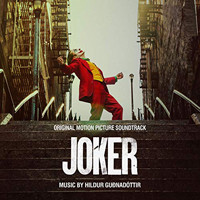- Composed by Hildur Guðnadóttir
- Watertower / 36m
We all have our own moral compass, a set of things we know we will never do because, simply, they are not right. Of course every person is different, and so is every person’s moral compass – what’s seen as fine by one person may be completely unacceptable to another. There are just a small number of things that pretty much everyone has in common – such as never, ever go and see a DC extended universe film because they’re all rubbish. Joker has left quite the moral quandary for many people, as has been widely reported: is this one really different? Dare I break that rule?
Because there are so few movies released which are based on comic book characters, there was clearly a gap in the market here which director Todd Philips has taken a shot at filling. Controversial, provocative, it’s not only got people to the cinema, it’s got them talking. It’s hard to imagine a film like Taxi Driver being made today and being as much of a financial success as it was back then – but here we have it, a way of making a film like Taxi Driver today (perhaps not coincidentally, comments from Martin Scorsese complaining that the Marvel films are not real cinema being widely reported at the same time).

Joker was never likely to have a score you were going to hum in the shower. In fact it was plausible it may not have had a score at all. But it’s got one all right – and quite a score it is, too. Hildur Guðnadóttir has been making a few splashes over the past couple of years, culminating in her extraordinarily creative score for the tv series Chernobyl a few months ago (unbelievably effective in context, but I dread to think what it might sound like on an album). I was expecting something very dark and abrasive, perhaps largely electronic, for Joker – but while it’s certainly very dark, it’s neither of the other things.
The score adopts a steady, constant tone – ominous strings with a focus on the cello (Guðnadóttir’s instrument), frequent references to the dies irae, claustrophobic percussion – it’s a brilliantly-realised portrait of what’s inside the Joker’s head. Undoubtedly, on a technical musical level, it is simple stuff – slow-paced, funereal in fact, the orchestration bare.
Where it achieves its complexity is in its extraordinary emotional depth – that and its clear narrative strength. Sure, you almost certainly won’t remember the melodies – but you’ll remember how it makes you feel.
In “Subway”, more than half way through the album, those inner thoughts of the Joker expressed by the cello and other strings suddenly collide with the wider orchestra, brass heard for the first time – and it’s a gruesome collision. Also of note, the brilliant “Bathroom Dance”, so pivotal in the film – so primal, so full of feeling.
Really though, this isn’t a score about individual moments – it’s the whole, the journey it takes you on. Just as some people have been so repulsed by the film they’ve walked out midway, so too I’m sure some people will not take to this album at all – it’s seriously dark, compositionally it’s simple, but it’s the place it takes you to that makes it stand out so much. I can’t see me wanting to listen to it very often, hence it doesn’t get top marks, but it’s really very deep, it’s made me think – and for a 2019 comic book blockbuster film score, that’s quite a thing. Unless there’s a wave of good feeling towards John Williams as he completes his phenomenal Star Wars journey (which would be great) – expect this one to dominate all the awards. And while her music may not be everyone’s cup of tea – I’m sure we can expect Hildur Guðnadóttir to become a very prominent film composer.
Rating: ****
facebook.com/moviewave | twitter.com/MovieWaveDotNet | amazon.com












A harsh, abrasive and souless score that should have been sub-texting the dysfunctionality inherent in the Joker’s boyhood–one that would explode in the murder of his mother when he, as an adult, confronts the truth surrounding the child that he once was.. It’s his toxic upbringing that causes his insane laughter to erupt whenever he’s anxious and stressed..it’s laughter that occurs at inopportune moments and causes violent reactions from bystanders. And highlighting these disturbing scenes is a cello– obviously not the soft, gentle and mellifluous sound of the instrument, but rather rough, rasping octaves. There’s none of the subtilty, sadness nor terror of a G0ldsmithian ‘FREUD’…a Bernstein ‘TO KILL A MOCKINBIRD’ or a Morricone ‘BIRD WITH THE CRYSTAL PLUMMAGE’. Are contemporary composers unaware of the amazing psychological undertones that these maestros were able to inject into music for broken characters?